Comprehensive Report: Planning a Two-Week Trip to South Korea
VerifiedAdded on 2020/05/16
|22
|4539
|65
Report
AI Summary
This report details the planning of a trip to South Korea, providing a comprehensive overview of the country's history, customs, and cultural nuances. It explores the motivations for travel, highlighting South Korea's heritage, festivals, and tourism development. The report delves into infrastructural aspects, including currency and visa requirements, and presents a two-week itinerary with hotel and entertainment suggestions. It analyzes both positive and negative aspects of South Korea as a tourist destination and concludes with a cost analysis. The report emphasizes the importance of respecting local customs and offers valuable insights for first-time visitors, making it a practical guide for anyone planning a trip to South Korea. The report is contributed by a student and published on Desklib, which is a platform providing AI-based study tools.
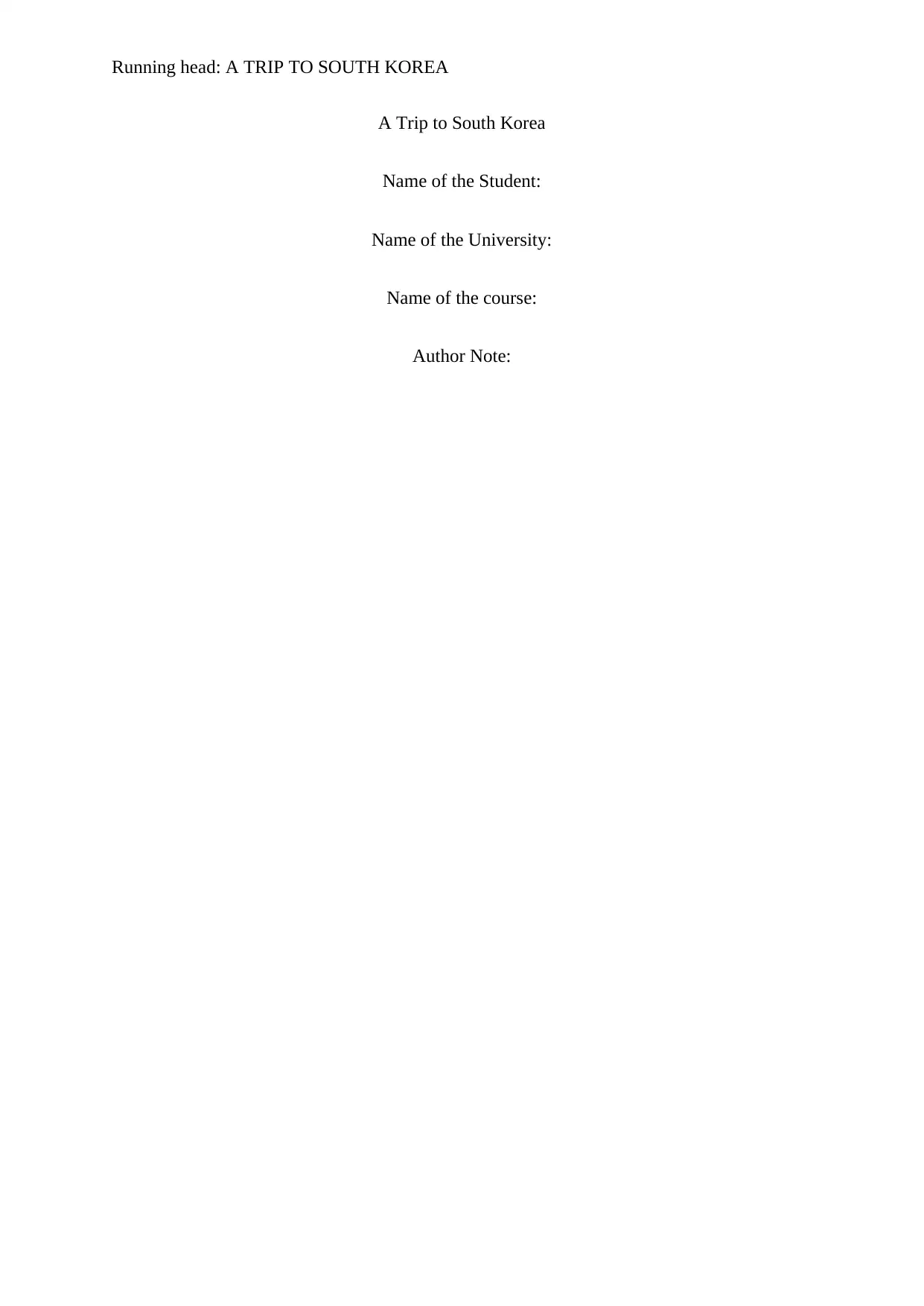
Running head: A TRIP TO SOUTH KOREA
A Trip to South Korea
Name of the Student:
Name of the University:
Name of the course:
Author Note:
A Trip to South Korea
Name of the Student:
Name of the University:
Name of the course:
Author Note:
Paraphrase This Document
Need a fresh take? Get an instant paraphrase of this document with our AI Paraphraser
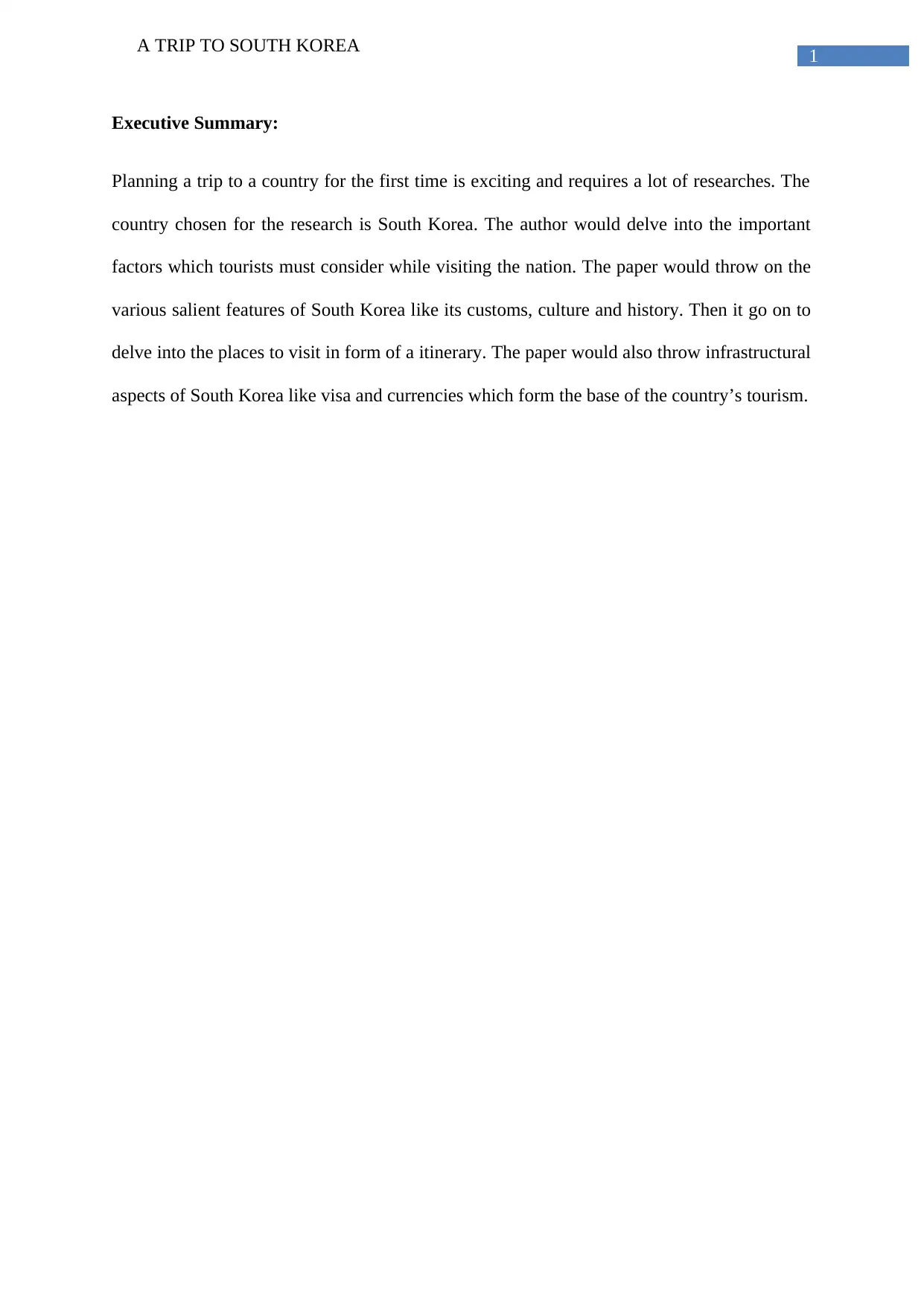
1
A TRIP TO SOUTH KOREA
Executive Summary:
Planning a trip to a country for the first time is exciting and requires a lot of researches. The
country chosen for the research is South Korea. The author would delve into the important
factors which tourists must consider while visiting the nation. The paper would throw on the
various salient features of South Korea like its customs, culture and history. Then it go on to
delve into the places to visit in form of a itinerary. The paper would also throw infrastructural
aspects of South Korea like visa and currencies which form the base of the country’s tourism.
A TRIP TO SOUTH KOREA
Executive Summary:
Planning a trip to a country for the first time is exciting and requires a lot of researches. The
country chosen for the research is South Korea. The author would delve into the important
factors which tourists must consider while visiting the nation. The paper would throw on the
various salient features of South Korea like its customs, culture and history. Then it go on to
delve into the places to visit in form of a itinerary. The paper would also throw infrastructural
aspects of South Korea like visa and currencies which form the base of the country’s tourism.
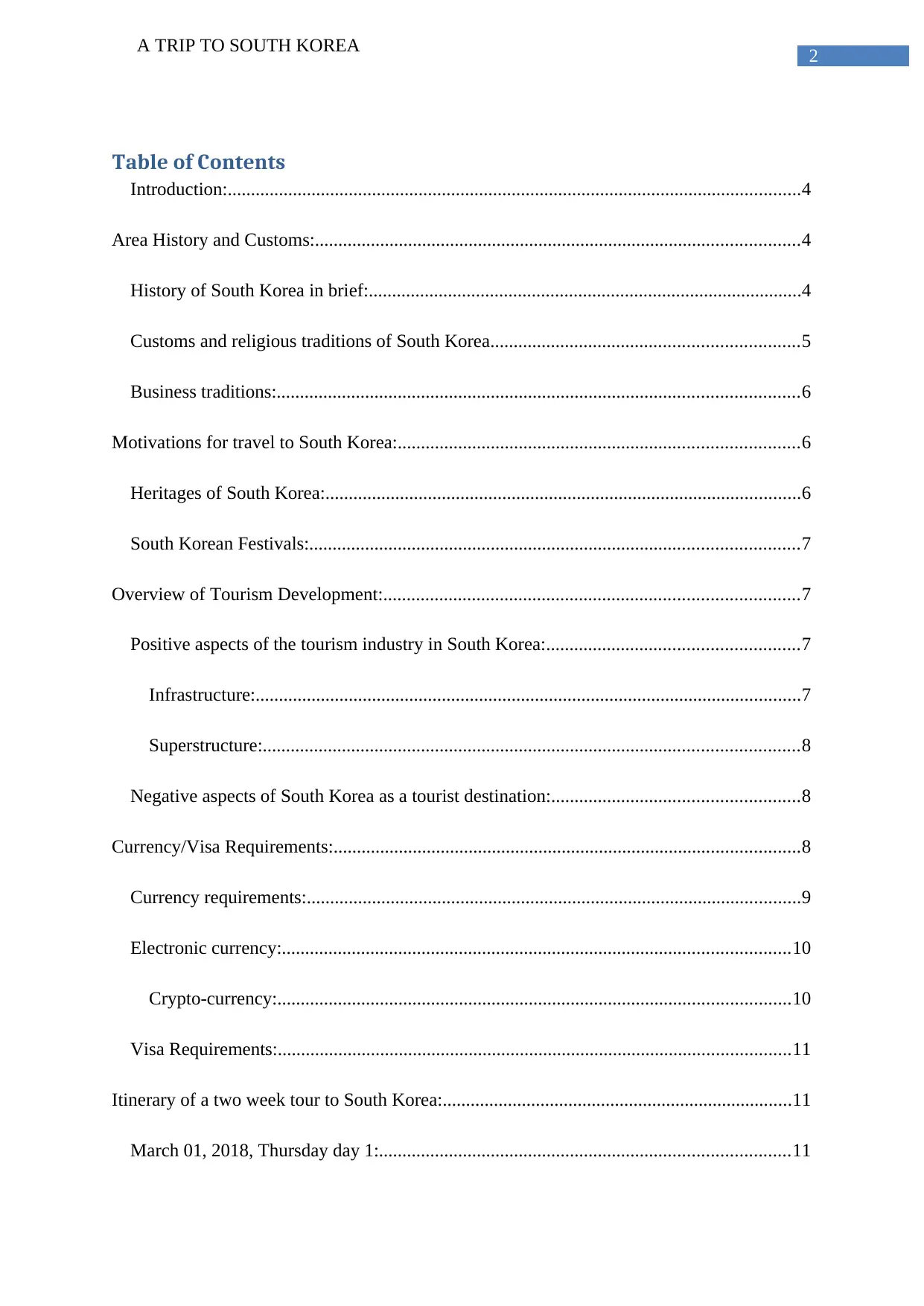
2
A TRIP TO SOUTH KOREA
Table of Contents
Introduction:...........................................................................................................................4
Area History and Customs:........................................................................................................4
History of South Korea in brief:.............................................................................................4
Customs and religious traditions of South Korea..................................................................5
Business traditions:................................................................................................................6
Motivations for travel to South Korea:......................................................................................6
Heritages of South Korea:......................................................................................................6
South Korean Festivals:.........................................................................................................7
Overview of Tourism Development:.........................................................................................7
Positive aspects of the tourism industry in South Korea:......................................................7
Infrastructure:.....................................................................................................................7
Superstructure:...................................................................................................................8
Negative aspects of South Korea as a tourist destination:.....................................................8
Currency/Visa Requirements:....................................................................................................8
Currency requirements:..........................................................................................................9
Electronic currency:.............................................................................................................10
Crypto-currency:..............................................................................................................10
Visa Requirements:..............................................................................................................11
Itinerary of a two week tour to South Korea:...........................................................................11
March 01, 2018, Thursday day 1:........................................................................................11
A TRIP TO SOUTH KOREA
Table of Contents
Introduction:...........................................................................................................................4
Area History and Customs:........................................................................................................4
History of South Korea in brief:.............................................................................................4
Customs and religious traditions of South Korea..................................................................5
Business traditions:................................................................................................................6
Motivations for travel to South Korea:......................................................................................6
Heritages of South Korea:......................................................................................................6
South Korean Festivals:.........................................................................................................7
Overview of Tourism Development:.........................................................................................7
Positive aspects of the tourism industry in South Korea:......................................................7
Infrastructure:.....................................................................................................................7
Superstructure:...................................................................................................................8
Negative aspects of South Korea as a tourist destination:.....................................................8
Currency/Visa Requirements:....................................................................................................8
Currency requirements:..........................................................................................................9
Electronic currency:.............................................................................................................10
Crypto-currency:..............................................................................................................10
Visa Requirements:..............................................................................................................11
Itinerary of a two week tour to South Korea:...........................................................................11
March 01, 2018, Thursday day 1:........................................................................................11
⊘ This is a preview!⊘
Do you want full access?
Subscribe today to unlock all pages.

Trusted by 1+ million students worldwide
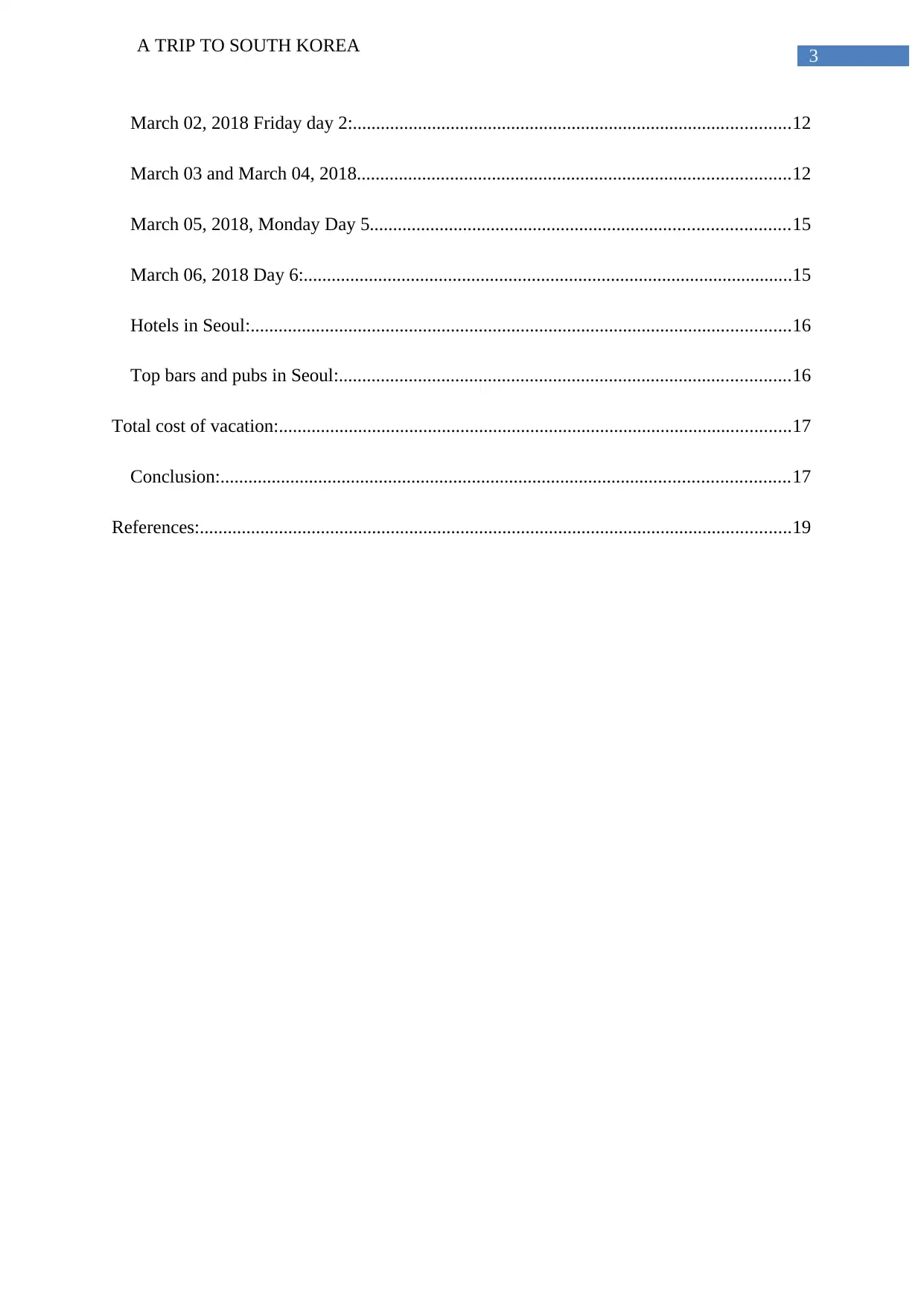
3
A TRIP TO SOUTH KOREA
March 02, 2018 Friday day 2:..............................................................................................12
March 03 and March 04, 2018.............................................................................................12
March 05, 2018, Monday Day 5..........................................................................................15
March 06, 2018 Day 6:.........................................................................................................15
Hotels in Seoul:....................................................................................................................16
Top bars and pubs in Seoul:.................................................................................................16
Total cost of vacation:..............................................................................................................17
Conclusion:..........................................................................................................................17
References:...............................................................................................................................19
A TRIP TO SOUTH KOREA
March 02, 2018 Friday day 2:..............................................................................................12
March 03 and March 04, 2018.............................................................................................12
March 05, 2018, Monday Day 5..........................................................................................15
March 06, 2018 Day 6:.........................................................................................................15
Hotels in Seoul:....................................................................................................................16
Top bars and pubs in Seoul:.................................................................................................16
Total cost of vacation:..............................................................................................................17
Conclusion:..........................................................................................................................17
References:...............................................................................................................................19
Paraphrase This Document
Need a fresh take? Get an instant paraphrase of this document with our AI Paraphraser
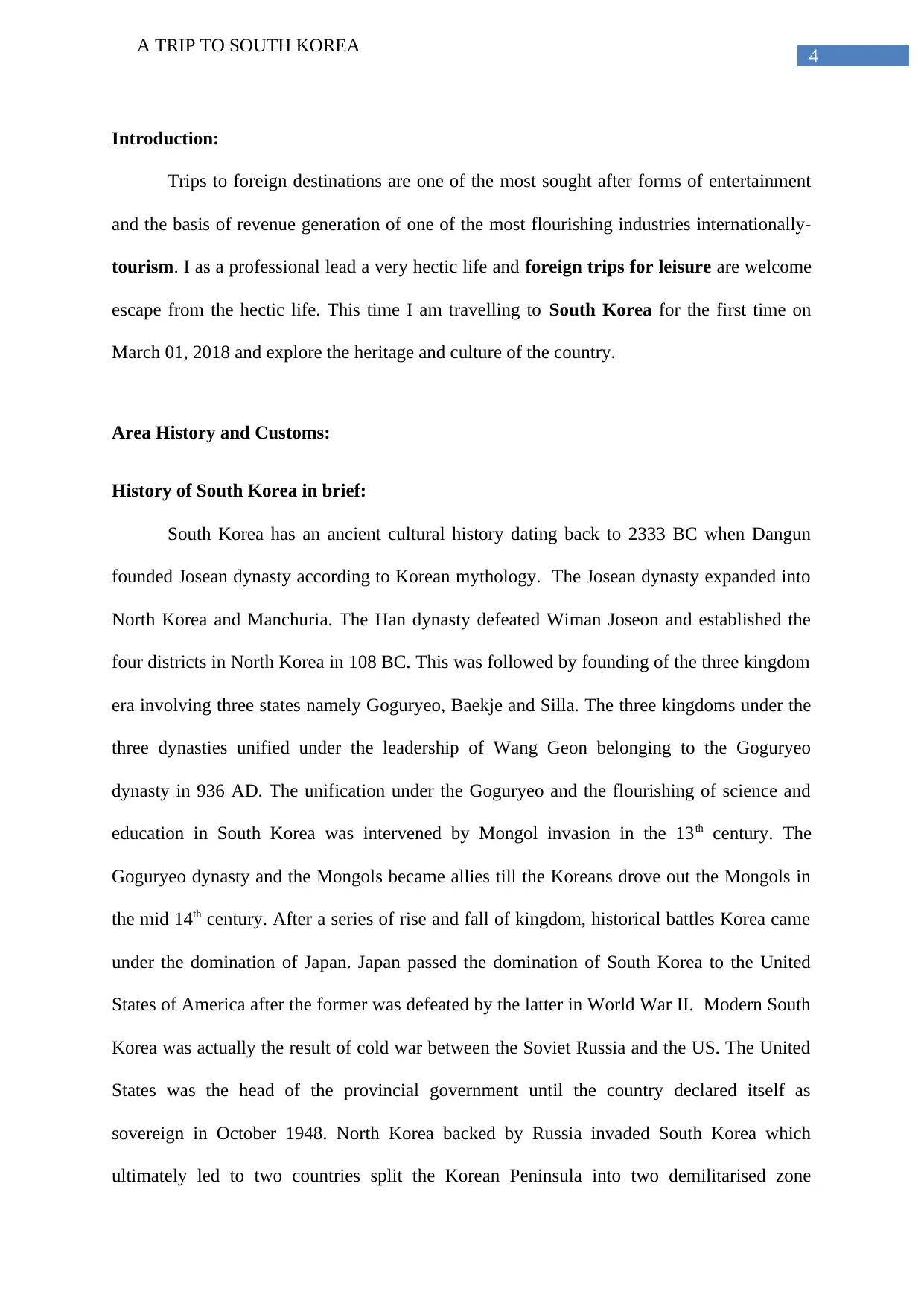
4
A TRIP TO SOUTH KOREA
Introduction:
Trips to foreign destinations are one of the most sought after forms of entertainment
and the basis of revenue generation of one of the most flourishing industries internationally-
tourism. I as a professional lead a very hectic life and foreign trips for leisure are welcome
escape from the hectic life. This time I am travelling to South Korea for the first time on
March 01, 2018 and explore the heritage and culture of the country.
Area History and Customs:
History of South Korea in brief:
South Korea has an ancient cultural history dating back to 2333 BC when Dangun
founded Josean dynasty according to Korean mythology. The Josean dynasty expanded into
North Korea and Manchuria. The Han dynasty defeated Wiman Joseon and established the
four districts in North Korea in 108 BC. This was followed by founding of the three kingdom
era involving three states namely Goguryeo, Baekje and Silla. The three kingdoms under the
three dynasties unified under the leadership of Wang Geon belonging to the Goguryeo
dynasty in 936 AD. The unification under the Goguryeo and the flourishing of science and
education in South Korea was intervened by Mongol invasion in the 13th century. The
Goguryeo dynasty and the Mongols became allies till the Koreans drove out the Mongols in
the mid 14th century. After a series of rise and fall of kingdom, historical battles Korea came
under the domination of Japan. Japan passed the domination of South Korea to the United
States of America after the former was defeated by the latter in World War II. Modern South
Korea was actually the result of cold war between the Soviet Russia and the US. The United
States was the head of the provincial government until the country declared itself as
sovereign in October 1948. North Korea backed by Russia invaded South Korea which
ultimately led to two countries split the Korean Peninsula into two demilitarised zone
A TRIP TO SOUTH KOREA
Introduction:
Trips to foreign destinations are one of the most sought after forms of entertainment
and the basis of revenue generation of one of the most flourishing industries internationally-
tourism. I as a professional lead a very hectic life and foreign trips for leisure are welcome
escape from the hectic life. This time I am travelling to South Korea for the first time on
March 01, 2018 and explore the heritage and culture of the country.
Area History and Customs:
History of South Korea in brief:
South Korea has an ancient cultural history dating back to 2333 BC when Dangun
founded Josean dynasty according to Korean mythology. The Josean dynasty expanded into
North Korea and Manchuria. The Han dynasty defeated Wiman Joseon and established the
four districts in North Korea in 108 BC. This was followed by founding of the three kingdom
era involving three states namely Goguryeo, Baekje and Silla. The three kingdoms under the
three dynasties unified under the leadership of Wang Geon belonging to the Goguryeo
dynasty in 936 AD. The unification under the Goguryeo and the flourishing of science and
education in South Korea was intervened by Mongol invasion in the 13th century. The
Goguryeo dynasty and the Mongols became allies till the Koreans drove out the Mongols in
the mid 14th century. After a series of rise and fall of kingdom, historical battles Korea came
under the domination of Japan. Japan passed the domination of South Korea to the United
States of America after the former was defeated by the latter in World War II. Modern South
Korea was actually the result of cold war between the Soviet Russia and the US. The United
States was the head of the provincial government until the country declared itself as
sovereign in October 1948. North Korea backed by Russia invaded South Korea which
ultimately led to two countries split the Korean Peninsula into two demilitarised zone
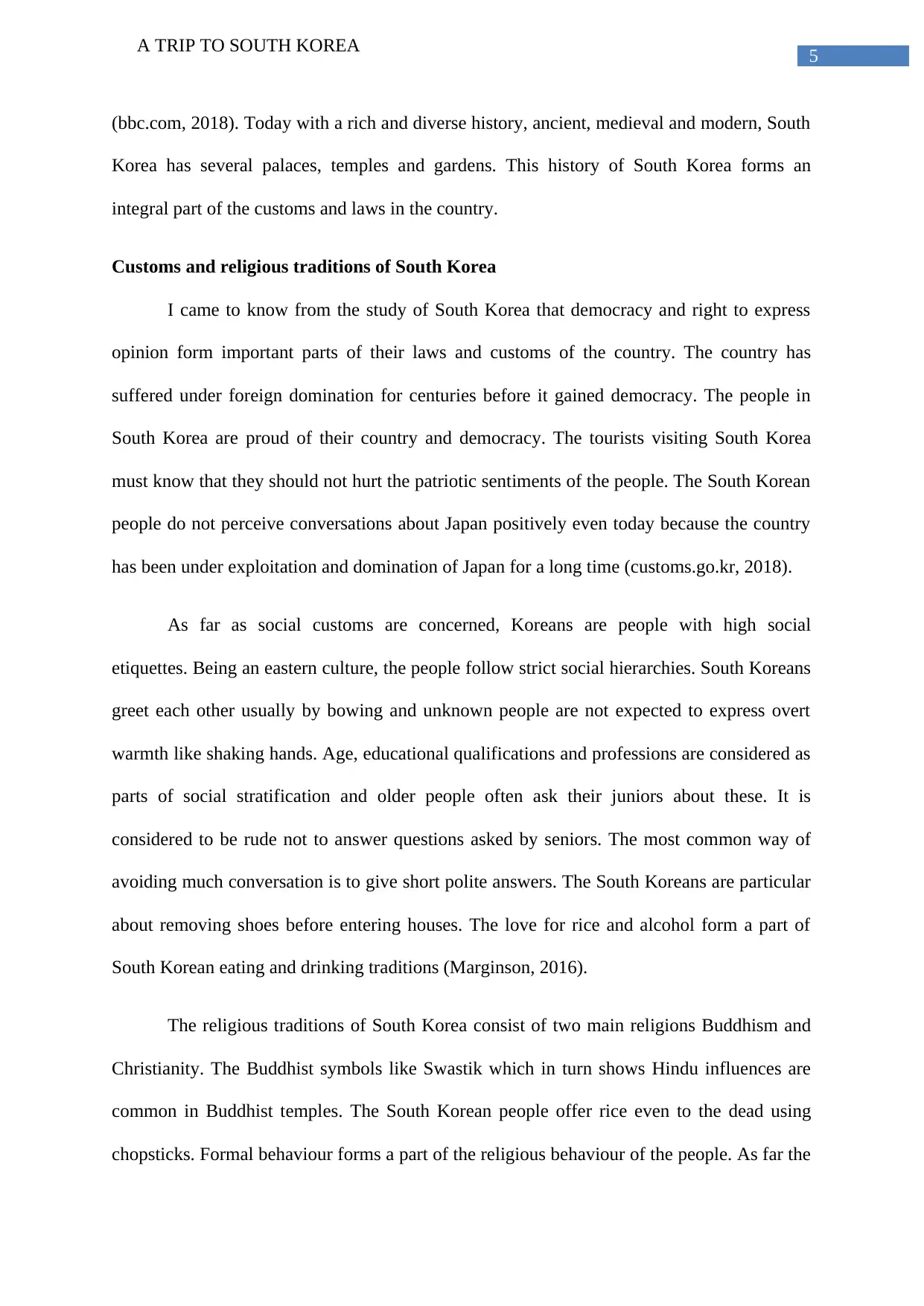
5
A TRIP TO SOUTH KOREA
(bbc.com, 2018). Today with a rich and diverse history, ancient, medieval and modern, South
Korea has several palaces, temples and gardens. This history of South Korea forms an
integral part of the customs and laws in the country.
Customs and religious traditions of South Korea
I came to know from the study of South Korea that democracy and right to express
opinion form important parts of their laws and customs of the country. The country has
suffered under foreign domination for centuries before it gained democracy. The people in
South Korea are proud of their country and democracy. The tourists visiting South Korea
must know that they should not hurt the patriotic sentiments of the people. The South Korean
people do not perceive conversations about Japan positively even today because the country
has been under exploitation and domination of Japan for a long time (customs.go.kr, 2018).
As far as social customs are concerned, Koreans are people with high social
etiquettes. Being an eastern culture, the people follow strict social hierarchies. South Koreans
greet each other usually by bowing and unknown people are not expected to express overt
warmth like shaking hands. Age, educational qualifications and professions are considered as
parts of social stratification and older people often ask their juniors about these. It is
considered to be rude not to answer questions asked by seniors. The most common way of
avoiding much conversation is to give short polite answers. The South Koreans are particular
about removing shoes before entering houses. The love for rice and alcohol form a part of
South Korean eating and drinking traditions (Marginson, 2016).
The religious traditions of South Korea consist of two main religions Buddhism and
Christianity. The Buddhist symbols like Swastik which in turn shows Hindu influences are
common in Buddhist temples. The South Korean people offer rice even to the dead using
chopsticks. Formal behaviour forms a part of the religious behaviour of the people. As far the
A TRIP TO SOUTH KOREA
(bbc.com, 2018). Today with a rich and diverse history, ancient, medieval and modern, South
Korea has several palaces, temples and gardens. This history of South Korea forms an
integral part of the customs and laws in the country.
Customs and religious traditions of South Korea
I came to know from the study of South Korea that democracy and right to express
opinion form important parts of their laws and customs of the country. The country has
suffered under foreign domination for centuries before it gained democracy. The people in
South Korea are proud of their country and democracy. The tourists visiting South Korea
must know that they should not hurt the patriotic sentiments of the people. The South Korean
people do not perceive conversations about Japan positively even today because the country
has been under exploitation and domination of Japan for a long time (customs.go.kr, 2018).
As far as social customs are concerned, Koreans are people with high social
etiquettes. Being an eastern culture, the people follow strict social hierarchies. South Koreans
greet each other usually by bowing and unknown people are not expected to express overt
warmth like shaking hands. Age, educational qualifications and professions are considered as
parts of social stratification and older people often ask their juniors about these. It is
considered to be rude not to answer questions asked by seniors. The most common way of
avoiding much conversation is to give short polite answers. The South Koreans are particular
about removing shoes before entering houses. The love for rice and alcohol form a part of
South Korean eating and drinking traditions (Marginson, 2016).
The religious traditions of South Korea consist of two main religions Buddhism and
Christianity. The Buddhist symbols like Swastik which in turn shows Hindu influences are
common in Buddhist temples. The South Korean people offer rice even to the dead using
chopsticks. Formal behaviour forms a part of the religious behaviour of the people. As far the
⊘ This is a preview!⊘
Do you want full access?
Subscribe today to unlock all pages.

Trusted by 1+ million students worldwide
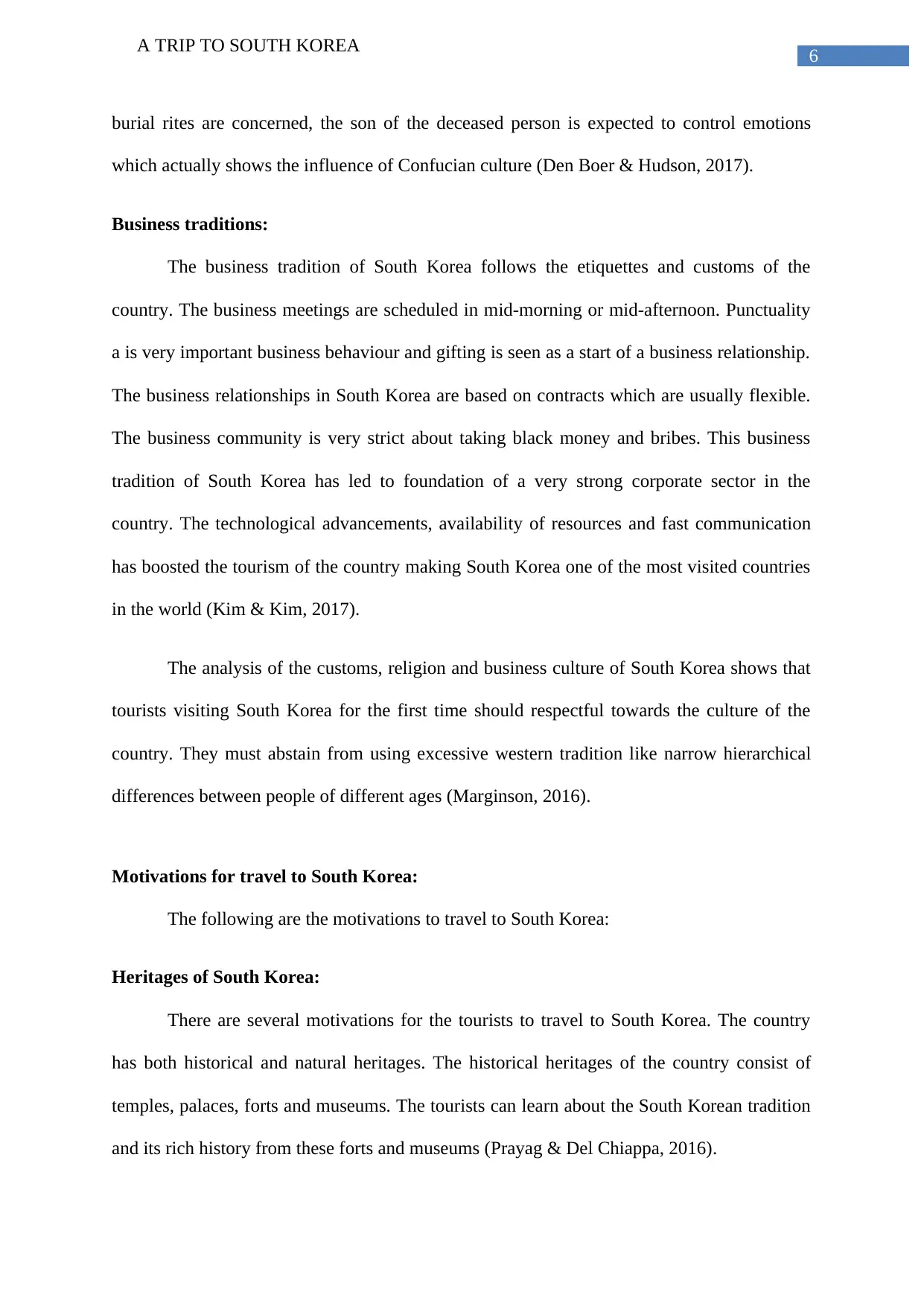
6
A TRIP TO SOUTH KOREA
burial rites are concerned, the son of the deceased person is expected to control emotions
which actually shows the influence of Confucian culture (Den Boer & Hudson, 2017).
Business traditions:
The business tradition of South Korea follows the etiquettes and customs of the
country. The business meetings are scheduled in mid-morning or mid-afternoon. Punctuality
a is very important business behaviour and gifting is seen as a start of a business relationship.
The business relationships in South Korea are based on contracts which are usually flexible.
The business community is very strict about taking black money and bribes. This business
tradition of South Korea has led to foundation of a very strong corporate sector in the
country. The technological advancements, availability of resources and fast communication
has boosted the tourism of the country making South Korea one of the most visited countries
in the world (Kim & Kim, 2017).
The analysis of the customs, religion and business culture of South Korea shows that
tourists visiting South Korea for the first time should respectful towards the culture of the
country. They must abstain from using excessive western tradition like narrow hierarchical
differences between people of different ages (Marginson, 2016).
Motivations for travel to South Korea:
The following are the motivations to travel to South Korea:
Heritages of South Korea:
There are several motivations for the tourists to travel to South Korea. The country
has both historical and natural heritages. The historical heritages of the country consist of
temples, palaces, forts and museums. The tourists can learn about the South Korean tradition
and its rich history from these forts and museums (Prayag & Del Chiappa, 2016).
A TRIP TO SOUTH KOREA
burial rites are concerned, the son of the deceased person is expected to control emotions
which actually shows the influence of Confucian culture (Den Boer & Hudson, 2017).
Business traditions:
The business tradition of South Korea follows the etiquettes and customs of the
country. The business meetings are scheduled in mid-morning or mid-afternoon. Punctuality
a is very important business behaviour and gifting is seen as a start of a business relationship.
The business relationships in South Korea are based on contracts which are usually flexible.
The business community is very strict about taking black money and bribes. This business
tradition of South Korea has led to foundation of a very strong corporate sector in the
country. The technological advancements, availability of resources and fast communication
has boosted the tourism of the country making South Korea one of the most visited countries
in the world (Kim & Kim, 2017).
The analysis of the customs, religion and business culture of South Korea shows that
tourists visiting South Korea for the first time should respectful towards the culture of the
country. They must abstain from using excessive western tradition like narrow hierarchical
differences between people of different ages (Marginson, 2016).
Motivations for travel to South Korea:
The following are the motivations to travel to South Korea:
Heritages of South Korea:
There are several motivations for the tourists to travel to South Korea. The country
has both historical and natural heritages. The historical heritages of the country consist of
temples, palaces, forts and museums. The tourists can learn about the South Korean tradition
and its rich history from these forts and museums (Prayag & Del Chiappa, 2016).
Paraphrase This Document
Need a fresh take? Get an instant paraphrase of this document with our AI Paraphraser
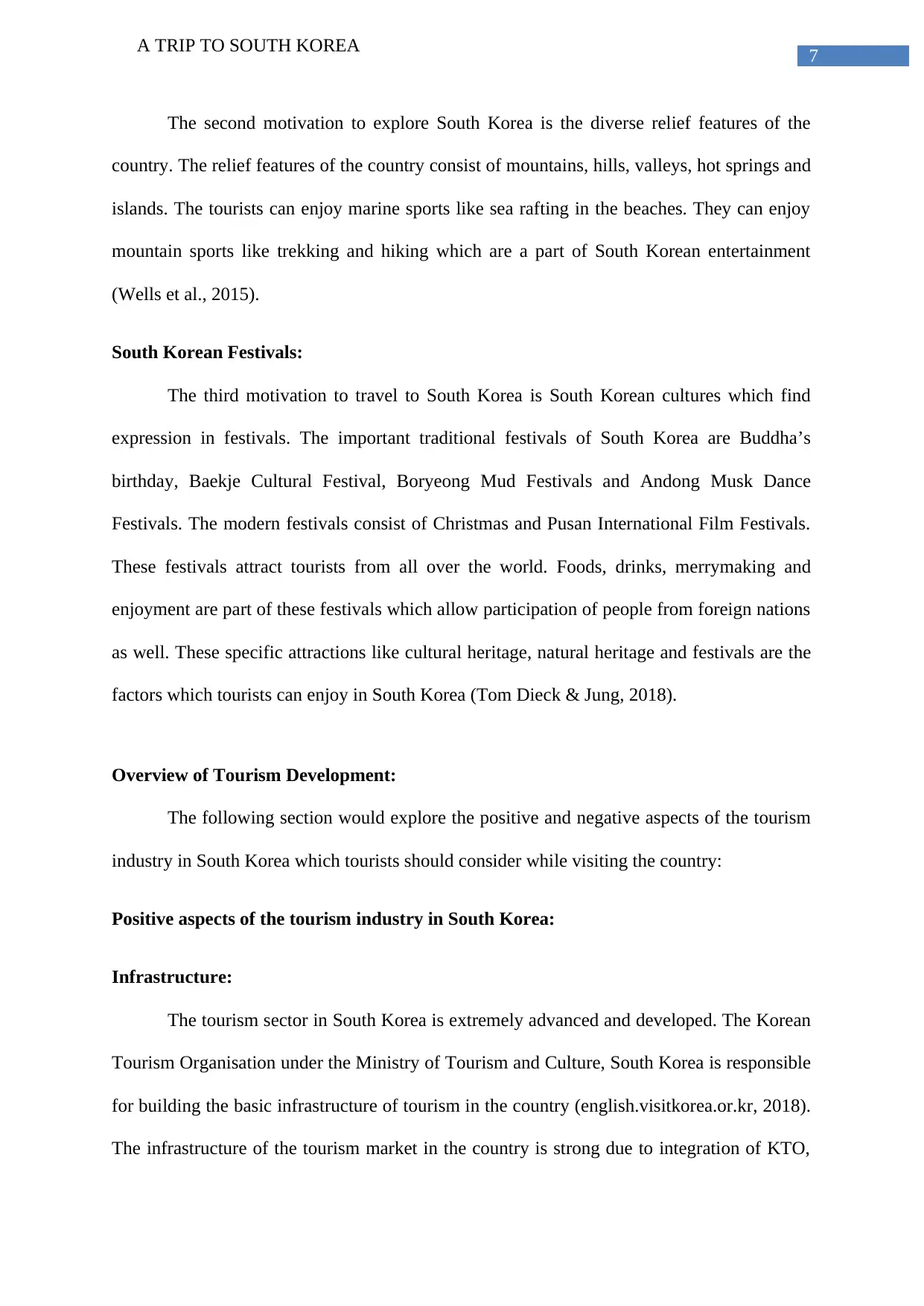
7
A TRIP TO SOUTH KOREA
The second motivation to explore South Korea is the diverse relief features of the
country. The relief features of the country consist of mountains, hills, valleys, hot springs and
islands. The tourists can enjoy marine sports like sea rafting in the beaches. They can enjoy
mountain sports like trekking and hiking which are a part of South Korean entertainment
(Wells et al., 2015).
South Korean Festivals:
The third motivation to travel to South Korea is South Korean cultures which find
expression in festivals. The important traditional festivals of South Korea are Buddha’s
birthday, Baekje Cultural Festival, Boryeong Mud Festivals and Andong Musk Dance
Festivals. The modern festivals consist of Christmas and Pusan International Film Festivals.
These festivals attract tourists from all over the world. Foods, drinks, merrymaking and
enjoyment are part of these festivals which allow participation of people from foreign nations
as well. These specific attractions like cultural heritage, natural heritage and festivals are the
factors which tourists can enjoy in South Korea (Tom Dieck & Jung, 2018).
Overview of Tourism Development:
The following section would explore the positive and negative aspects of the tourism
industry in South Korea which tourists should consider while visiting the country:
Positive aspects of the tourism industry in South Korea:
Infrastructure:
The tourism sector in South Korea is extremely advanced and developed. The Korean
Tourism Organisation under the Ministry of Tourism and Culture, South Korea is responsible
for building the basic infrastructure of tourism in the country (english.visitkorea.or.kr, 2018).
The infrastructure of the tourism market in the country is strong due to integration of KTO,
A TRIP TO SOUTH KOREA
The second motivation to explore South Korea is the diverse relief features of the
country. The relief features of the country consist of mountains, hills, valleys, hot springs and
islands. The tourists can enjoy marine sports like sea rafting in the beaches. They can enjoy
mountain sports like trekking and hiking which are a part of South Korean entertainment
(Wells et al., 2015).
South Korean Festivals:
The third motivation to travel to South Korea is South Korean cultures which find
expression in festivals. The important traditional festivals of South Korea are Buddha’s
birthday, Baekje Cultural Festival, Boryeong Mud Festivals and Andong Musk Dance
Festivals. The modern festivals consist of Christmas and Pusan International Film Festivals.
These festivals attract tourists from all over the world. Foods, drinks, merrymaking and
enjoyment are part of these festivals which allow participation of people from foreign nations
as well. These specific attractions like cultural heritage, natural heritage and festivals are the
factors which tourists can enjoy in South Korea (Tom Dieck & Jung, 2018).
Overview of Tourism Development:
The following section would explore the positive and negative aspects of the tourism
industry in South Korea which tourists should consider while visiting the country:
Positive aspects of the tourism industry in South Korea:
Infrastructure:
The tourism sector in South Korea is extremely advanced and developed. The Korean
Tourism Organisation under the Ministry of Tourism and Culture, South Korea is responsible
for building the basic infrastructure of tourism in the country (english.visitkorea.or.kr, 2018).
The infrastructure of the tourism market in the country is strong due to integration of KTO,
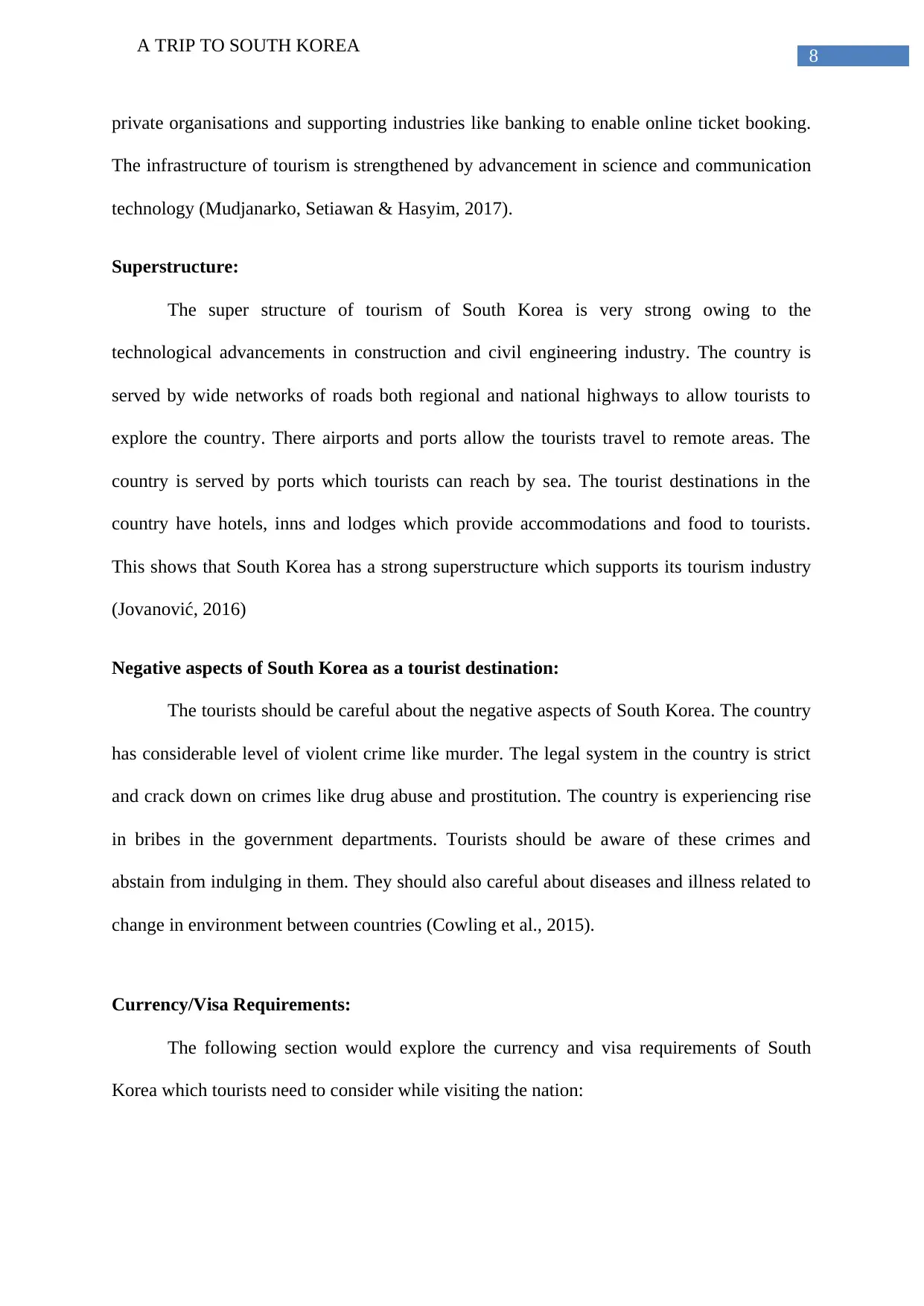
8
A TRIP TO SOUTH KOREA
private organisations and supporting industries like banking to enable online ticket booking.
The infrastructure of tourism is strengthened by advancement in science and communication
technology (Mudjanarko, Setiawan & Hasyim, 2017).
Superstructure:
The super structure of tourism of South Korea is very strong owing to the
technological advancements in construction and civil engineering industry. The country is
served by wide networks of roads both regional and national highways to allow tourists to
explore the country. There airports and ports allow the tourists travel to remote areas. The
country is served by ports which tourists can reach by sea. The tourist destinations in the
country have hotels, inns and lodges which provide accommodations and food to tourists.
This shows that South Korea has a strong superstructure which supports its tourism industry
(Jovanović, 2016)
Negative aspects of South Korea as a tourist destination:
The tourists should be careful about the negative aspects of South Korea. The country
has considerable level of violent crime like murder. The legal system in the country is strict
and crack down on crimes like drug abuse and prostitution. The country is experiencing rise
in bribes in the government departments. Tourists should be aware of these crimes and
abstain from indulging in them. They should also careful about diseases and illness related to
change in environment between countries (Cowling et al., 2015).
Currency/Visa Requirements:
The following section would explore the currency and visa requirements of South
Korea which tourists need to consider while visiting the nation:
A TRIP TO SOUTH KOREA
private organisations and supporting industries like banking to enable online ticket booking.
The infrastructure of tourism is strengthened by advancement in science and communication
technology (Mudjanarko, Setiawan & Hasyim, 2017).
Superstructure:
The super structure of tourism of South Korea is very strong owing to the
technological advancements in construction and civil engineering industry. The country is
served by wide networks of roads both regional and national highways to allow tourists to
explore the country. There airports and ports allow the tourists travel to remote areas. The
country is served by ports which tourists can reach by sea. The tourist destinations in the
country have hotels, inns and lodges which provide accommodations and food to tourists.
This shows that South Korea has a strong superstructure which supports its tourism industry
(Jovanović, 2016)
Negative aspects of South Korea as a tourist destination:
The tourists should be careful about the negative aspects of South Korea. The country
has considerable level of violent crime like murder. The legal system in the country is strict
and crack down on crimes like drug abuse and prostitution. The country is experiencing rise
in bribes in the government departments. Tourists should be aware of these crimes and
abstain from indulging in them. They should also careful about diseases and illness related to
change in environment between countries (Cowling et al., 2015).
Currency/Visa Requirements:
The following section would explore the currency and visa requirements of South
Korea which tourists need to consider while visiting the nation:
⊘ This is a preview!⊘
Do you want full access?
Subscribe today to unlock all pages.

Trusted by 1+ million students worldwide
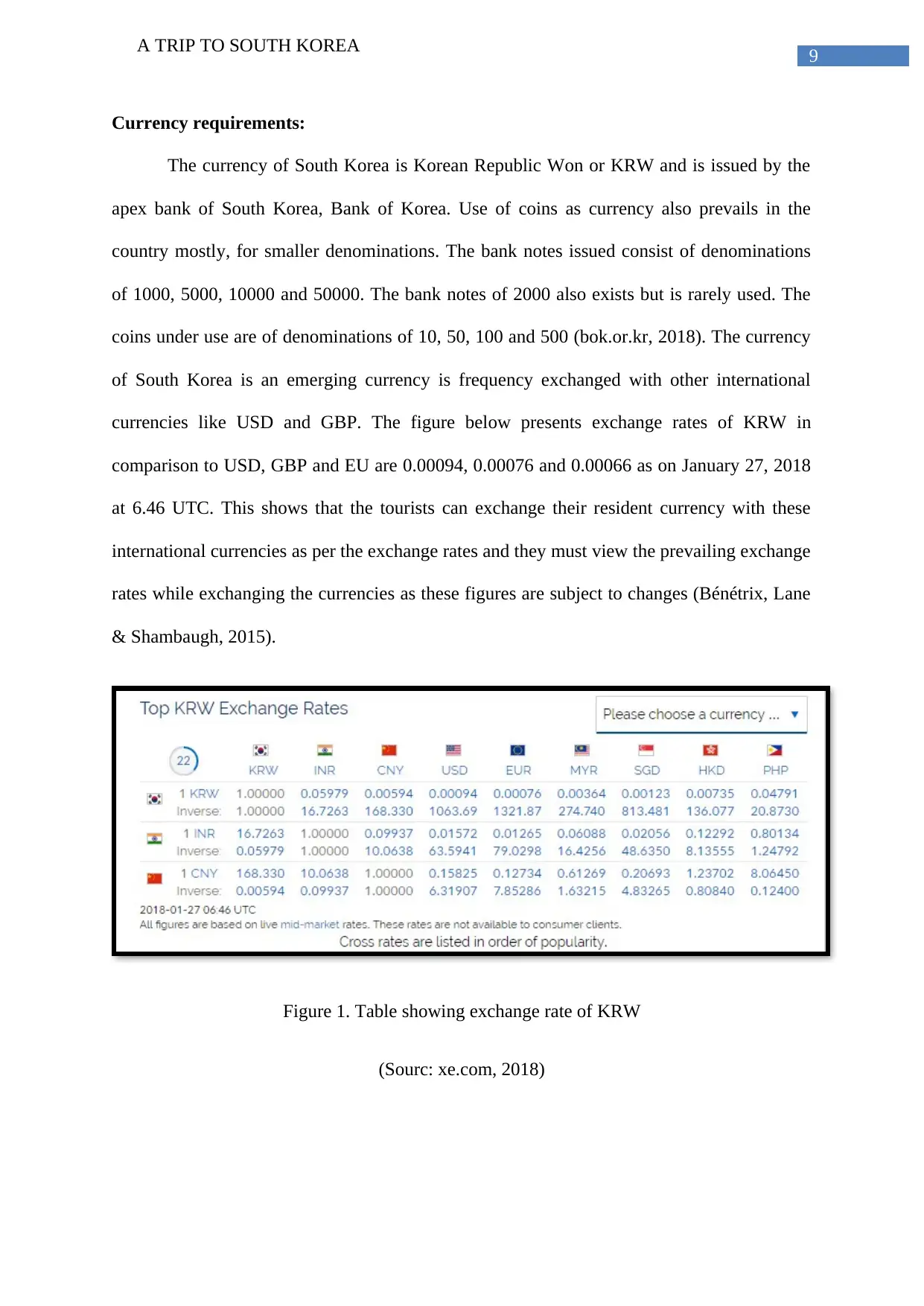
9
A TRIP TO SOUTH KOREA
Currency requirements:
The currency of South Korea is Korean Republic Won or KRW and is issued by the
apex bank of South Korea, Bank of Korea. Use of coins as currency also prevails in the
country mostly, for smaller denominations. The bank notes issued consist of denominations
of 1000, 5000, 10000 and 50000. The bank notes of 2000 also exists but is rarely used. The
coins under use are of denominations of 10, 50, 100 and 500 (bok.or.kr, 2018). The currency
of South Korea is an emerging currency is frequency exchanged with other international
currencies like USD and GBP. The figure below presents exchange rates of KRW in
comparison to USD, GBP and EU are 0.00094, 0.00076 and 0.00066 as on January 27, 2018
at 6.46 UTC. This shows that the tourists can exchange their resident currency with these
international currencies as per the exchange rates and they must view the prevailing exchange
rates while exchanging the currencies as these figures are subject to changes (Bénétrix, Lane
& Shambaugh, 2015).
Figure 1. Table showing exchange rate of KRW
(Sourc: xe.com, 2018)
A TRIP TO SOUTH KOREA
Currency requirements:
The currency of South Korea is Korean Republic Won or KRW and is issued by the
apex bank of South Korea, Bank of Korea. Use of coins as currency also prevails in the
country mostly, for smaller denominations. The bank notes issued consist of denominations
of 1000, 5000, 10000 and 50000. The bank notes of 2000 also exists but is rarely used. The
coins under use are of denominations of 10, 50, 100 and 500 (bok.or.kr, 2018). The currency
of South Korea is an emerging currency is frequency exchanged with other international
currencies like USD and GBP. The figure below presents exchange rates of KRW in
comparison to USD, GBP and EU are 0.00094, 0.00076 and 0.00066 as on January 27, 2018
at 6.46 UTC. This shows that the tourists can exchange their resident currency with these
international currencies as per the exchange rates and they must view the prevailing exchange
rates while exchanging the currencies as these figures are subject to changes (Bénétrix, Lane
& Shambaugh, 2015).
Figure 1. Table showing exchange rate of KRW
(Sourc: xe.com, 2018)
Paraphrase This Document
Need a fresh take? Get an instant paraphrase of this document with our AI Paraphraser
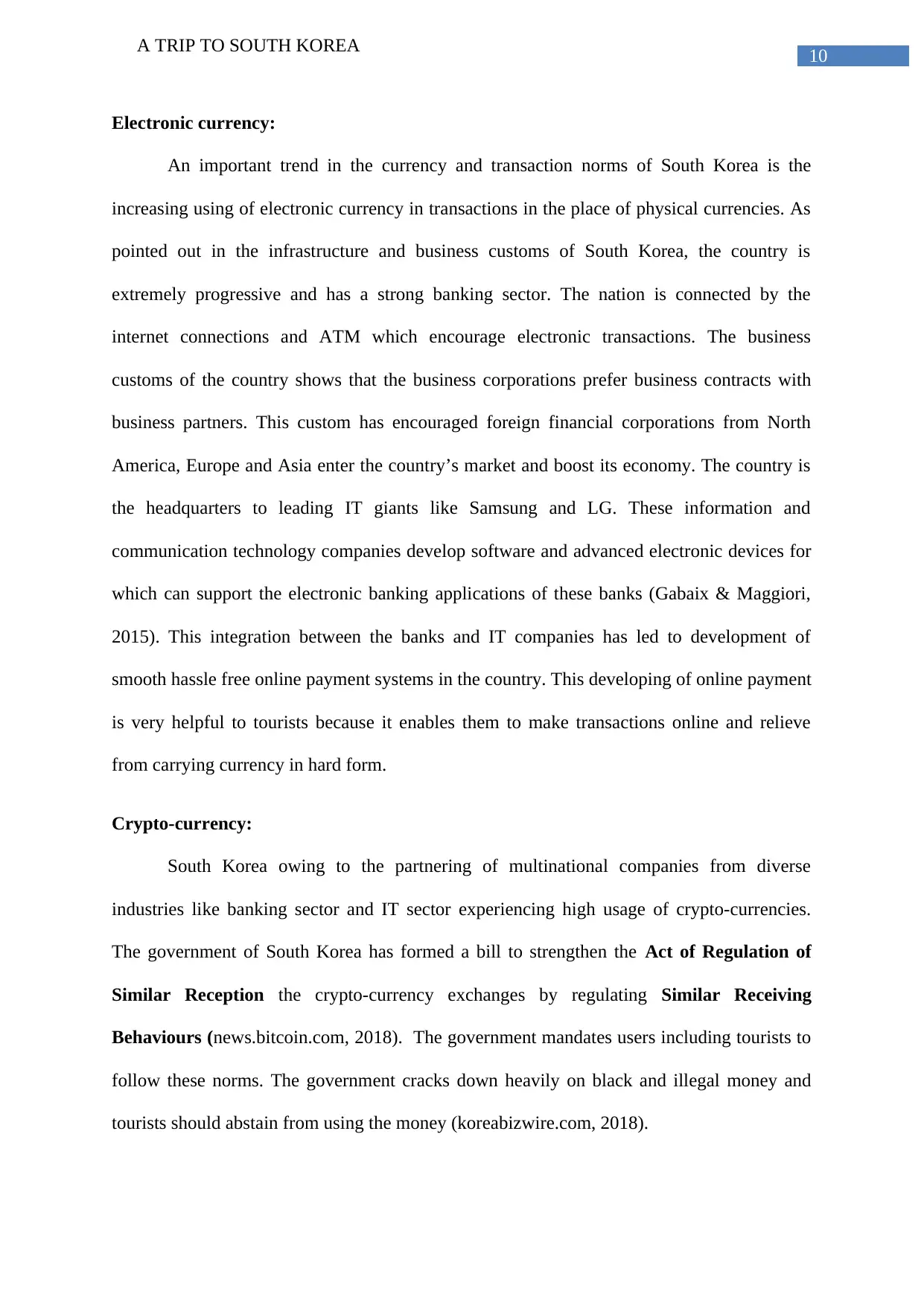
10
A TRIP TO SOUTH KOREA
Electronic currency:
An important trend in the currency and transaction norms of South Korea is the
increasing using of electronic currency in transactions in the place of physical currencies. As
pointed out in the infrastructure and business customs of South Korea, the country is
extremely progressive and has a strong banking sector. The nation is connected by the
internet connections and ATM which encourage electronic transactions. The business
customs of the country shows that the business corporations prefer business contracts with
business partners. This custom has encouraged foreign financial corporations from North
America, Europe and Asia enter the country’s market and boost its economy. The country is
the headquarters to leading IT giants like Samsung and LG. These information and
communication technology companies develop software and advanced electronic devices for
which can support the electronic banking applications of these banks (Gabaix & Maggiori,
2015). This integration between the banks and IT companies has led to development of
smooth hassle free online payment systems in the country. This developing of online payment
is very helpful to tourists because it enables them to make transactions online and relieve
from carrying currency in hard form.
Crypto-currency:
South Korea owing to the partnering of multinational companies from diverse
industries like banking sector and IT sector experiencing high usage of crypto-currencies.
The government of South Korea has formed a bill to strengthen the Act of Regulation of
Similar Reception the crypto-currency exchanges by regulating Similar Receiving
Behaviours (news.bitcoin.com, 2018). The government mandates users including tourists to
follow these norms. The government cracks down heavily on black and illegal money and
tourists should abstain from using the money (koreabizwire.com, 2018).
A TRIP TO SOUTH KOREA
Electronic currency:
An important trend in the currency and transaction norms of South Korea is the
increasing using of electronic currency in transactions in the place of physical currencies. As
pointed out in the infrastructure and business customs of South Korea, the country is
extremely progressive and has a strong banking sector. The nation is connected by the
internet connections and ATM which encourage electronic transactions. The business
customs of the country shows that the business corporations prefer business contracts with
business partners. This custom has encouraged foreign financial corporations from North
America, Europe and Asia enter the country’s market and boost its economy. The country is
the headquarters to leading IT giants like Samsung and LG. These information and
communication technology companies develop software and advanced electronic devices for
which can support the electronic banking applications of these banks (Gabaix & Maggiori,
2015). This integration between the banks and IT companies has led to development of
smooth hassle free online payment systems in the country. This developing of online payment
is very helpful to tourists because it enables them to make transactions online and relieve
from carrying currency in hard form.
Crypto-currency:
South Korea owing to the partnering of multinational companies from diverse
industries like banking sector and IT sector experiencing high usage of crypto-currencies.
The government of South Korea has formed a bill to strengthen the Act of Regulation of
Similar Reception the crypto-currency exchanges by regulating Similar Receiving
Behaviours (news.bitcoin.com, 2018). The government mandates users including tourists to
follow these norms. The government cracks down heavily on black and illegal money and
tourists should abstain from using the money (koreabizwire.com, 2018).
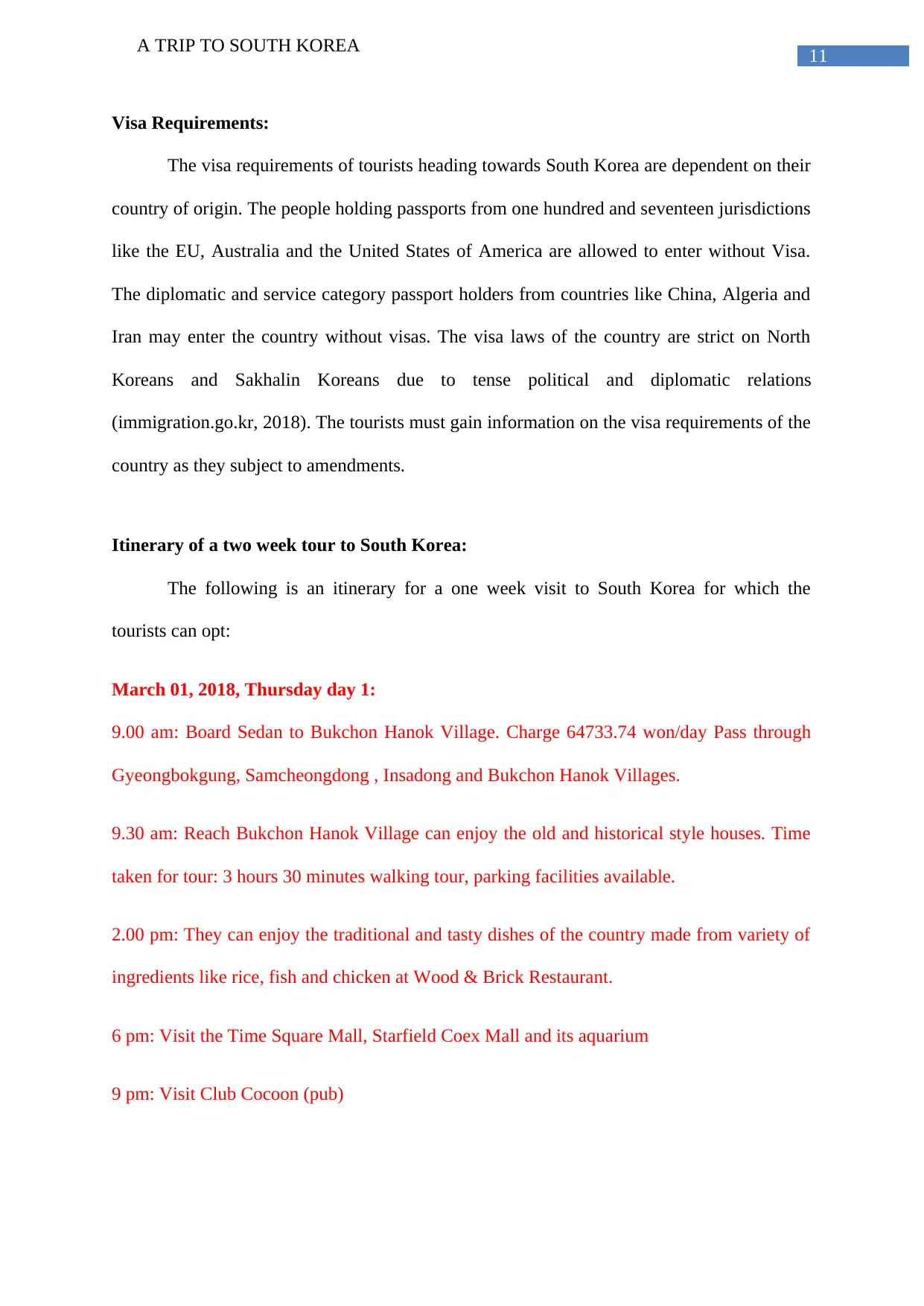
11
A TRIP TO SOUTH KOREA
Visa Requirements:
The visa requirements of tourists heading towards South Korea are dependent on their
country of origin. The people holding passports from one hundred and seventeen jurisdictions
like the EU, Australia and the United States of America are allowed to enter without Visa.
The diplomatic and service category passport holders from countries like China, Algeria and
Iran may enter the country without visas. The visa laws of the country are strict on North
Koreans and Sakhalin Koreans due to tense political and diplomatic relations
(immigration.go.kr, 2018). The tourists must gain information on the visa requirements of the
country as they subject to amendments.
Itinerary of a two week tour to South Korea:
The following is an itinerary for a one week visit to South Korea for which the
tourists can opt:
March 01, 2018, Thursday day 1:
9.00 am: Board Sedan to Bukchon Hanok Village. Charge 64733.74 won/day Pass through
Gyeongbokgung, Samcheongdong , Insadong and Bukchon Hanok Villages.
9.30 am: Reach Bukchon Hanok Village can enjoy the old and historical style houses. Time
taken for tour: 3 hours 30 minutes walking tour, parking facilities available.
2.00 pm: They can enjoy the traditional and tasty dishes of the country made from variety of
ingredients like rice, fish and chicken at Wood & Brick Restaurant.
6 pm: Visit the Time Square Mall, Starfield Coex Mall and its aquarium
9 pm: Visit Club Cocoon (pub)
A TRIP TO SOUTH KOREA
Visa Requirements:
The visa requirements of tourists heading towards South Korea are dependent on their
country of origin. The people holding passports from one hundred and seventeen jurisdictions
like the EU, Australia and the United States of America are allowed to enter without Visa.
The diplomatic and service category passport holders from countries like China, Algeria and
Iran may enter the country without visas. The visa laws of the country are strict on North
Koreans and Sakhalin Koreans due to tense political and diplomatic relations
(immigration.go.kr, 2018). The tourists must gain information on the visa requirements of the
country as they subject to amendments.
Itinerary of a two week tour to South Korea:
The following is an itinerary for a one week visit to South Korea for which the
tourists can opt:
March 01, 2018, Thursday day 1:
9.00 am: Board Sedan to Bukchon Hanok Village. Charge 64733.74 won/day Pass through
Gyeongbokgung, Samcheongdong , Insadong and Bukchon Hanok Villages.
9.30 am: Reach Bukchon Hanok Village can enjoy the old and historical style houses. Time
taken for tour: 3 hours 30 minutes walking tour, parking facilities available.
2.00 pm: They can enjoy the traditional and tasty dishes of the country made from variety of
ingredients like rice, fish and chicken at Wood & Brick Restaurant.
6 pm: Visit the Time Square Mall, Starfield Coex Mall and its aquarium
9 pm: Visit Club Cocoon (pub)
⊘ This is a preview!⊘
Do you want full access?
Subscribe today to unlock all pages.

Trusted by 1+ million students worldwide
1 out of 22
Your All-in-One AI-Powered Toolkit for Academic Success.
+13062052269
info@desklib.com
Available 24*7 on WhatsApp / Email
![[object Object]](/_next/static/media/star-bottom.7253800d.svg)
Unlock your academic potential
Copyright © 2020–2026 A2Z Services. All Rights Reserved. Developed and managed by ZUCOL.